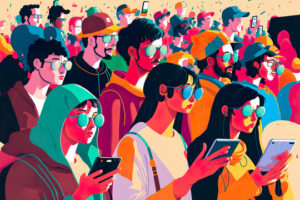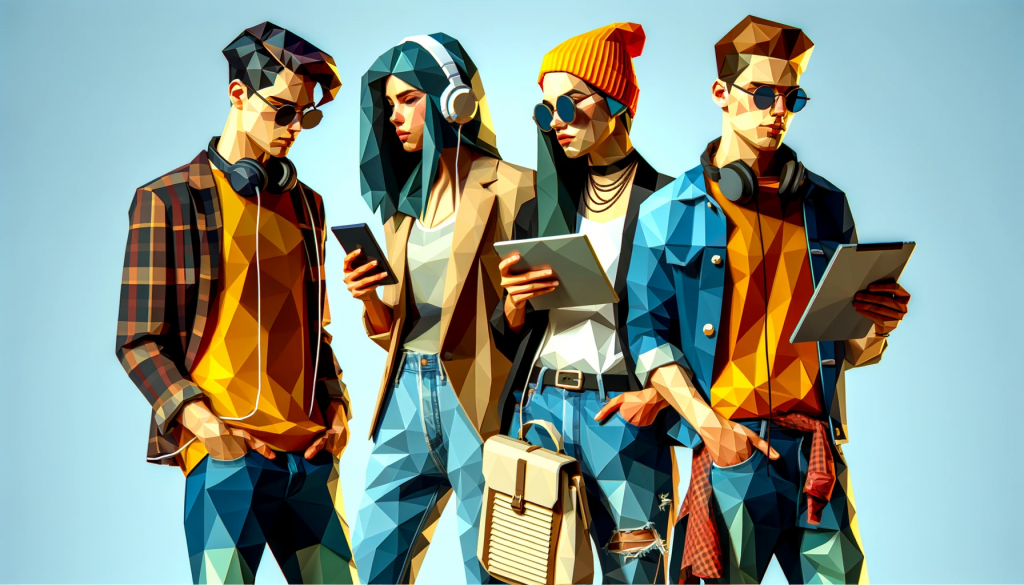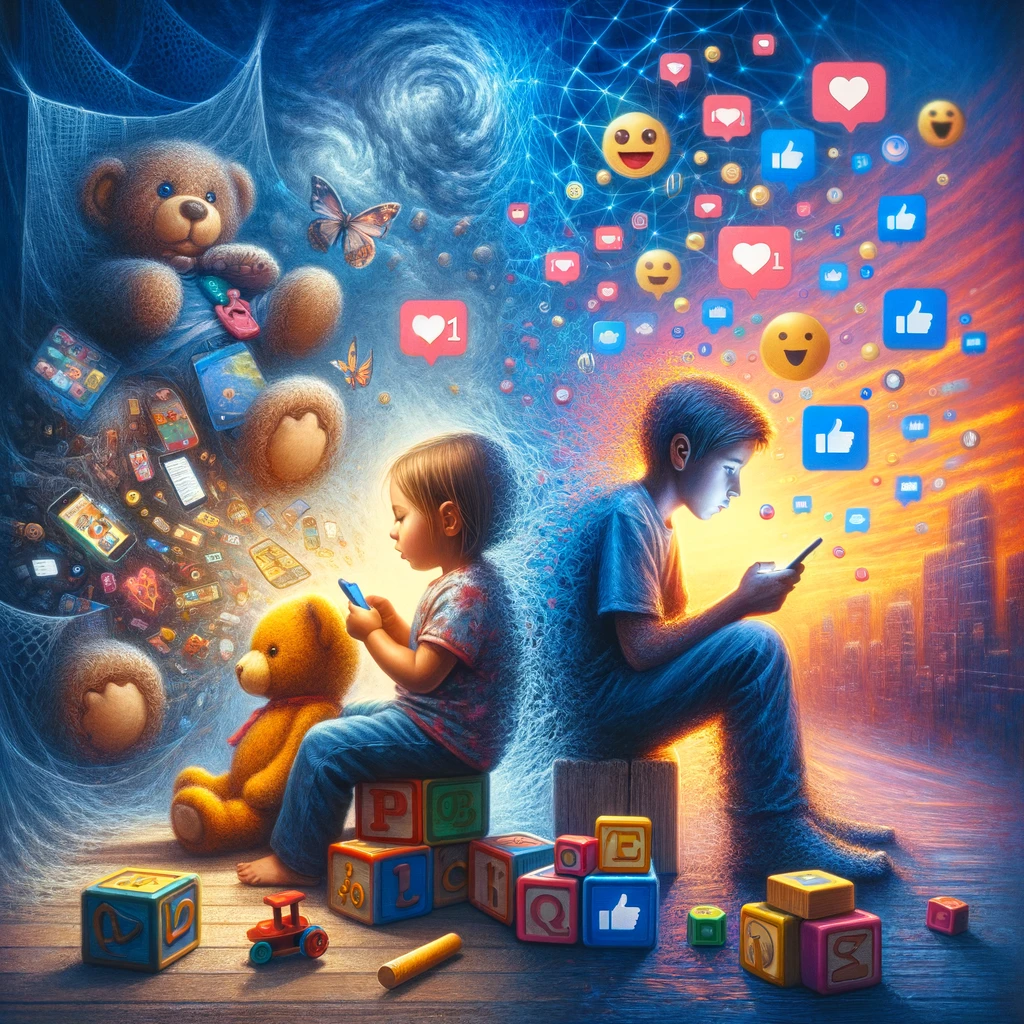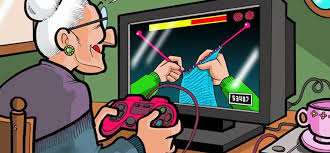In the digital age, we are more connected than ever, yet paradoxically, growing increasingly distant from one another. Technological tools, social networks, and apps simplify daily tasks, bringing convenience and speed to our lives. However, this ease of access also has a less-discussed side effect: the distancing of people from one another. In this article, we’ll explore how technology, while essential, may be pulling us away from genuine connections and meaningful moments.

The Digital Era and the Illusion of Closeness
The digital age offers countless ways to stay in touch: instant messaging, video calls, and social media enable us to interact with friends, family, and colleagues, regardless of distance. However, this ease can lead us to believe we are truly present in each other’s lives when, in reality, many of these interactions lack depth.
Social Networks: A Superficial Connection
Social networks are a primary means of digital communication, but they often promote a shallow connection. Likes, comments, and shares are easy to give but usually don’t provide the empathy and attentive listening that a real conversation requires. Thus, social networks create an illusion of closeness and support, but they don’t replace the physical presence and face-to-face interaction.
An Example of Social Distancing Through Networks
A recent study found that frequent users of social media, especially young adults, report feeling lonelier and more disconnected, despite having hundreds of “friends” online. This is because these interactions often don’t equate to deep and true friendships, creating an emotional void that cannot be filled by clicks and emojis.

Instant Messaging and the Loss of Real Dialogue
Fast, instant digital communication has its advantages but also contributes to the loss of true dialogue. The brief, quick nature of instant messaging leads people to share only the essentials, leaving out the longer, more detailed conversations that foster genuine connection.
The Impersonal Nature of Virtual Communications
Instead of a nuanced, emotional conversation, we often opt for short text messages that don’t convey tone of voice, facial expressions, or body language. As a result, the quality of interactions suffers. Complex issues, personal problems, and feelings are often simplified or ignored in quick messages, making it harder to achieve a deeper understanding between people.
The Erosion of Empathy in Communication
With the increasing use of texting and emails, people may lose the empathy that comes from direct contact. Empathy, essential for authentic human connection, is easily ignored in virtual communications, which can lead to emotional distancing. When we don’t see or hear the other person, it’s easier to overlook emotional nuances and, consequently, devalue the relationship.
The Search for Convenience and the Distancing of Relationships
Digital technology was created to simplify tasks and maximize time. However, the constant use of devices for quick interactions may discourage in-person meetings. People often prefer the convenience of online communication, forgoing the effort needed for face-to-face interactions that are more meaningful and authentic.
Dating Apps: Convenience or Superficiality?
Dating apps, for example, make it easy to find people with similar interests. Yet, this convenience can lead to superficial, transient relationships, as people may move on as soon as minor obstacles arise. The ease of connecting and disconnecting can result in relationships that never develop depth.
Emotional Exhaustion and the Void of Superficial Relationships
Moreover, the constant “matching” and “swiping” on dating apps creates the illusion that there will always be someone better. This leads to a superficiality in relationships, where people are seen as disposable. This cycle of quick, replaceable interactions can cause emotional exhaustion, resulting in loneliness and a sense of emptiness.

The Impact of Technology on Mental Health and Well-Being
The convenience that technology provides also significantly impacts mental health. Constant exposure to digital devices and a lack of personal interactions can lead to anxiety, stress, and depression. The need to stay connected and up-to-date increases pressure, often without offering real emotional relief.
FOMO (Fear of Missing Out) and Digital Anxiety
The fear of missing something important or not being “in the know” (known as FOMO) is a common consequence of the digital age. Many people feel they need to check social media constantly to avoid feeling excluded, which generates anxiety and reduces the time available for quality in-person interactions.
Digital Burnout: The Effect of Information Overload
Another effect of the digital age is digital burnout, an exhaustion caused by excessive online information and stimuli. This phenomenon affects people’s ability to engage emotionally, leading them to avoid social gatherings or deep conversations. Digital burnout contributes to detachment, as people feel mentally overwhelmed and lack the energy to invest in real relationships.
How to Overcome Distancing in the Digital Age
While digital technology is a part of our lives and brings many benefits, it’s essential to find balance. Adopting practices that promote real contact and deep connection can help combat relationship distancing.
Practices to Strengthen Personal Connections
- Set Boundaries for Technology Use: Define specific times for social media and messaging. This creates space for personal and in-person interactions.
- Prioritize Face-to-Face Meetings: Whenever possible, choose in-person meetings. Physical presence strengthens bonds and fosters more empathetic exchanges.
- Practice Active Listening: During interactions, whether by phone or in person, pay attention and avoid distractions. Active listening shows interest and reinforces emotional connections.
- Schedule Digital Detox Moments: Take time to step away from digital devices. Use this time to be with family and friends, doing activities that foster bonding and relaxation.

Develop the Habit of Deep Communication
Many relationships, especially the closest ones, benefit from deep communication. Taking time to discuss important issues, sharing thoughts and feelings without rushing, is essential for nurturing meaningful connections.
Cultivate Empathy in the Digital World
In online communications, making a conscious effort to interpret and respond empathetically can enrich relationships. Using video calls instead of messages, for example, can increase the feeling of closeness and help convey emotions and intentions more clearly.
The Importance of Slowing Down and Being Present
In a fast-paced, digital world, slowing down is essential. Taking a moment to pause, breathe, and observe the little things around us helps restore emotional balance and reinforces our relationships. By being present, we can perceive and value the company of others more intensely and genuinely.
Rediscovering Human Connection
Rediscovering face-to-face interactions and moments of digital disconnection can positively transform our lives. Ultimately, genuine personal relationships are essential for our well-being and happiness. Remembering that people need real closeness and emotional connection helps us avoid letting the convenience of the digital age become a barrier to true human connection.
Conclusion
In the digital age, the convenience technology offers is a double-edged sword. On the one hand, it makes communication quick and easy; on the other, it can drive people apart and compromise the depth of relationships. We believe we are closer to each other, but in reality, many interactions lack meaning and authenticity. Combating this distancing requires a change in habits: choosing physical presence whenever possible, setting boundaries for technology use, and cultivating deep conversations.
In the end, true connection is made through effort, time, and presence. By balancing technology with moments of real contact, we can restore the empathy, understanding, and human bonds that we value so much. This is the key to lasting well-being and relationships that truly matter.
In the Digital Age, Convenience Drives People Apart – How Will Relationships Be in a World Completely Dependent on Screens?



